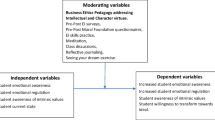Abstract
This paper focuses specifically on taughtcourses in business ethics for post-experiencestudents. The theme of this paper is thatvalues have a dual nature, involving bothemotional and cognitive elements. This dualnature is not always clearly acknowledged byparticipants in business ethics courses. Thisleads to a range of different ways in whichmisunderstanding can arise, and which is oftennot well handled in ethics classes. Twoparticular examples are considered: theseparation of personal and professional ethics,and the tendency for people to manage risk inprobabilistic terms rather than in human. TheKohlberg model is critiqued briefly, andpreference is given to Forsyth's model ofethical decision ideologies. The paperconcludes with some suggestions of positiveapproaches to business ethics teaching,involving virtue ethics and the critical theoryof Jurgen Habermas. This involves abandoningclassroom based tutition for a more personaldevelopment oriented approach.
Similar content being viewed by others
REFERENCES
Adams, S.: 1996, The Dilbert Principle, Boxtree, London.
Anscombe, G. E. M.: 1981, 'Modern Moral Philosophy', in The Collected Philosophical Papers of GEM Anscombe, Volume 3, Blackwell, Oxford, pp. 26–42.
Argyris, C.: 1992, On Organizational Learning, Blackwell, Oxford.
Burgoyne, J., T. Boydell and M. Pedlar: 1994, A Manager's Guide to Self Development, 3rd edition, McGraw-Hill, London.
Crisp, R. and M. Slote (eds.): 1997, Virtue Ethics, Oxford University Press, Oxford.
Foot, P.: 1978, Virtues and Vices, Blackwell, Oxford.
Forsyth, D. R.: 1980, 'A Taxonomy of Ethical Decision Ideologies', Journal of Personality and Social Psychology 39, 175–184.
Goleman, D.: 1996, Emotional Intelligence, Why it Can Matter More than IQ, Bloomsbury, London.
Griseri, P.: 1998, Managing Values, Macmillan, Basingstoke.
Habermas, J.: 1971, Knowledge and Human Interests, 2nd edition, Heinemann, London.
Hamilton, E. and H. Cairns: 1963, 'Meno', in The Collected Dialogues of Plato, Princeton University Press, New Jersey.
Hursthouse, R.: 1999, On Virtue Ethics, Oxford University Press, Oxford.
Kohlberg, L.: 1984, The Psychology of Moral Developmen: The Nature and Validity of Moral Stages, Harper and Row, San Francisco.
McDowell, J.: 1979, 'Virtue and Reason', reprinted in R. Crisp and M. Slote (eds.): 1997, Virtue Ethics, Oxford University Press, Oxford, pp. 141–162.
McIntyre, A.: 1999, Dependent Rational Animals, Duckworth, London.
Schon, D.: 1983, The Reflective Practitioner, Basic Books, New York.
Weber, C. E.: 1995, Stories of Virtue in Business, University Press of America, Lanham.
Whetstone, J. T.: 1998, 'Teaching Ethics to Managers', in C. Cowton, and R. Crisp (eds.), Business Ethics: Perspectives on the Practice of Theory, Oxford University Press, Oxford, pp. 177–202.
Author information
Authors and Affiliations
Rights and permissions
About this article
Cite this article
Griseri, P. Emotion and Cognition in Business Ethics Teaching. Teaching Business Ethics 6, 371–391 (2002). https://doi.org/10.1023/A:1016104330016
Issue Date:
DOI: https://doi.org/10.1023/A:1016104330016




